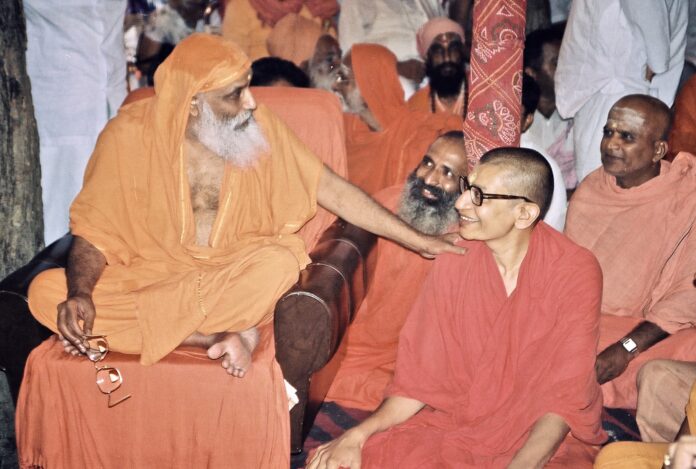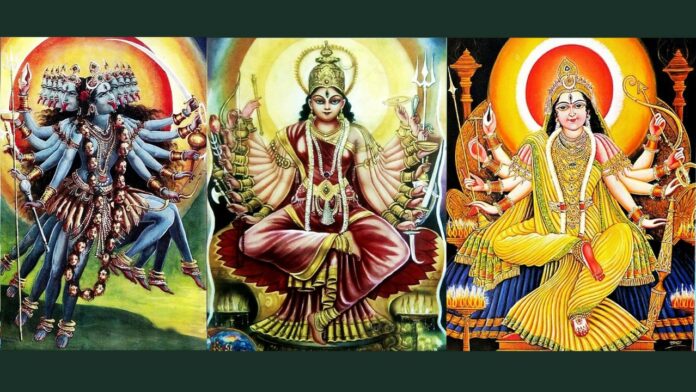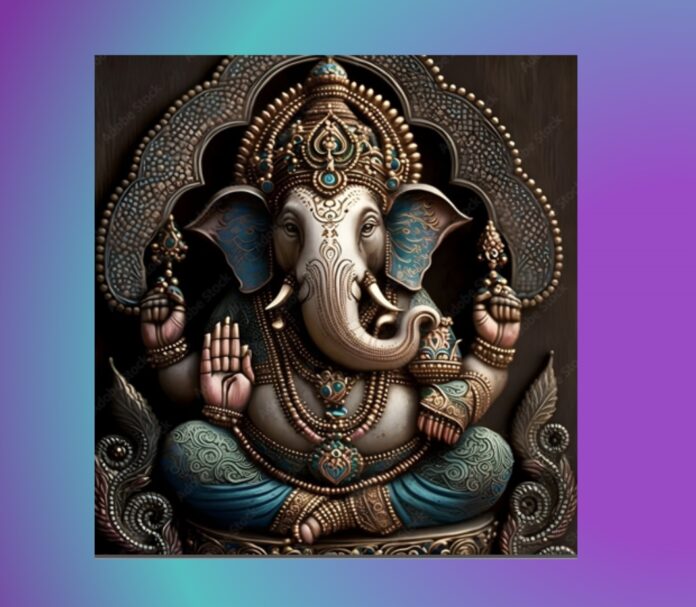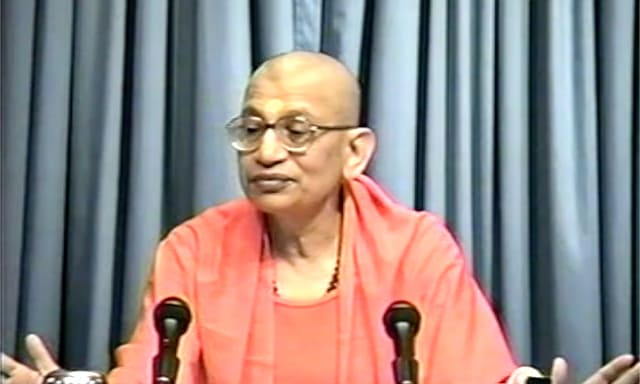Satsang with Sri Swami Viditatmananda Saraswati
Transcribed and edited by Chaya Raj, KK Davey and Jayshree Ramakrishnan.
Question
What is the first thing that needs to be done to achieve self-knowledge?
Answer
What one needs in order to gain self-knowledge is a mind that enjoys purity, citta śuddhi, as well as steadiness, citta naiścalyam. Citta śuddhi is freedom from the impurities of likes and dislikes, and citta naiścalyam is the ability to focus the mind, single pointedness. Citta śuddhi or purification of the mind is the first requirement to achieve self-knowledge. The main purpose of gṛhastha-āśrama, the life of a householder, is to provide means for the purification of the mind. The attitude of prayerfulness in living a life of dharma and worship is itself purifying.
Question
Do we need a guru for this process?
Answer
The Upaniṣad says, tadvijṅānārthaṁ sa gurumevābhigacchet, to know Brahman, one should go to a teacher [Muṇḍakopaniṣad 1-2-12]. Even if the mind is prepared, one should not pursue the contemplation of the self on one’s own. The study of the scriptures and the contemplation upon the scriptures should be done only under the guidance of a guru. Śrī Śaṅkarācārya says “śāstrajṅopi svātantryena brahma- jṅānānveṣaṇam na kuryāt”, even if one is very learned, one should not pursue the enquiry into the nature of the Self independently.
Question
How do we find the right guru?
Answer
All we can say is that you do what you need to do and you will come across the right guru. You may perhaps find a series of gurus. You always get what you need at a given time. As long as you are sincere and do what you need to do, you will find the right guru because there is a provision for that in this creation. When there is a sincere commitment to spiritual growth and a real commitment or a real desire for knowledge, then the guru has to come. The right guru just happens! It happens by the grace of god. Even the desire for knowledge arises because of the grace of god. It is all the grace of god. If you feel that the right guru has not come along, pray to the Lord.
Question
How did great bhaktās like Meerabai and Kabir gain self-knowledge without receiving the Vedantic teachings formally from a guru?
Answer
The process of seeking self-knowledge or spiritual growth does not commence in this lifetime only; it is an ongoing process. The fact that we are listening to Vedanta is a result of what we started in our earlier lives. You may perhaps say that you came to the gurukulam because someone invited you. Yes, that person who invited you should be given some credit, but there is something in you too, that has prompted you to come. That person has perhaps invited many others too, but they have not shown any interest in Vedanta. Even though we tell a number of people to attend Vedanta classes most of them do not bother to do so. If somebody comes here, it shows that there is some openness to this in that person. Lord Krishna says in the Bhagavad Gita [7-19]:
बहूनां जन्मनामन्ते ज्ञानवान्मां प्रपद्यते |
वासुदेव: सर्वमिति स महात्मा सुदुर्लभ: ||
bahūnāṁ janmanām ante jñānavān māṁ prapadyate
vāsudevaḥ sarvam iti sa mahātmā su-durlabhaḥ
At the end of many births, the one who has knowledge reaches Me by knowing Vāsudeva is everything. That wise man is rare.
Bahūnāṁ janmanāmante, at the end of many births, jṅānavān māṁ prapadyate, one gains the knowledge that everything is Vāsudeva or Brahman, vāsudevaḥ sarvam. One gains that knowledge as a result of a pursuit that spans many lifetimes. Sa mahātmā sudurlabhaḥ, that great soul is very rare. Thus, the greatness of bhaktās like Meerabai is a result of the pursuit over many lifetimes.
If you examine the life of any great person even in other areas of knowledge, you will find that their greatness is not a result of the work of one lifetime. For example, Albert Einstein was just 25 years old when he first published his paper on the Theory of Relativity. If you consider his work and accomplishments you can appreciate that most people will require many lifetimes even to understand it. This cannot have been the result of the work in one lifetime. It is a result of the work done over many lifetimes. An ordinary person may take years to learn something, but some people get it in just a few minutes. It is very difficult to know what contributed to a particular accomplishment. We have brought these saṁskāras with us from our past lives.
Despite being with a guru for a long time, nothing happens to many people. How did this self-knowledge happen so easily for people like Meerabai? It happened because their mind was ready for it in this lifetime; it was being prepared in all their previous lifetimes. They were pursuing self-knowledge, came with the right saṁskāras in this lifetime, and these saṁskāras were aroused. Very often, people say that when they listen to Vedanta it is as though they already knew this, as though this is a reminder of what they already knew. This can only be explained as being a continuation of what is already there. Nobody attains this in one lifetime. Even if you gain the knowledge, it is possible that there is some obstacle, which comes in the way of your abidance in the knowledge. You may have to take another birth to remove that obstacle. These great souls may have taken many previous births for some obstacle to be removed and therefore, you may not see them actually going to the teacher and studying the scriptures. They already have whatever one would get by studying the scriptures. Perhaps whatever else was needed came in the course of the satsangs that they had. You will notice that these great souls had an association with some mahātmas in their life.
Meerabai says, mohe lagi latak guru charan na ki, there is this love, this craving for the lotus feet of my teacher. She says that people think that she is also a sādhu, because she was always entertaining the company of the sādhus. A sādhu means a fellow who wanders about and these sādhus are not favorably viewed in the society. Meerabai says, “On account of being with these sādhus for so long, people think that I am also like that! Nowhere am I looked upon as a queen.” Even Kabir always talks about a guru. They always sing about a guru in their compositions. It shows that they have an idea of a guru and look upon somebody as a guru. Maybe they did not need all the elaborate teachings that other people require! Therefore, it is better not to emulate the example of these great souls in this aspect. Let us not think that self-knowledge will dawn upon us without studying with a guru. It is best that we take the well-trodden path of studying the scriptures with a teacher. If it happens without a guru, it is alright, but let us not make a deliberate choice to study the scriptures without a teacher.
What we observe in the lives of these great souls is just the tip of the iceberg. There is so much more to how they came to be thus, that we do not see. There is a story to illustrate this idea. Apparently, many sages were once complaining, “Look at this Dhruva! This five-year old devotee of the Lord performed a penance for six months in the forest, and Lord Nārāyaṇa appeared before him! We perform penance for years together and yet he does not appear before us! Where is the justice in this? Is this fair?” They were at an oceanfront and a boatman who overheard these sages complaining, invited them for a ride in his boat. They agreed, and the boatman took them far into the ocean. They came across an island, on which there appeared to be a mountain. The boatman addressed the sages, “Do you see that?” The sages said, “Yes. What mountain is it?” “It is not a mountain. It is a heap of the bones of the embodiments of Dhruva’s previous lifetimes.” He showed them several other islands, which were full of such big heaps. The boatman said, “All of these are the remains of Dhruva from his previous janmas!” Thus, what we see is a five year old boy, but then he has gone through all of these births.
There is fairness in the order. It requires all these sādhanas or pursuits for one to achieve self-knowledge. It is best that we take the well-trodden path, which is prescribed in the scriptures and not assume that we are an exception to that. We must understand that the great souls have also gone through this spiritual path and were what they were because of what they must have done in their previous lives.




